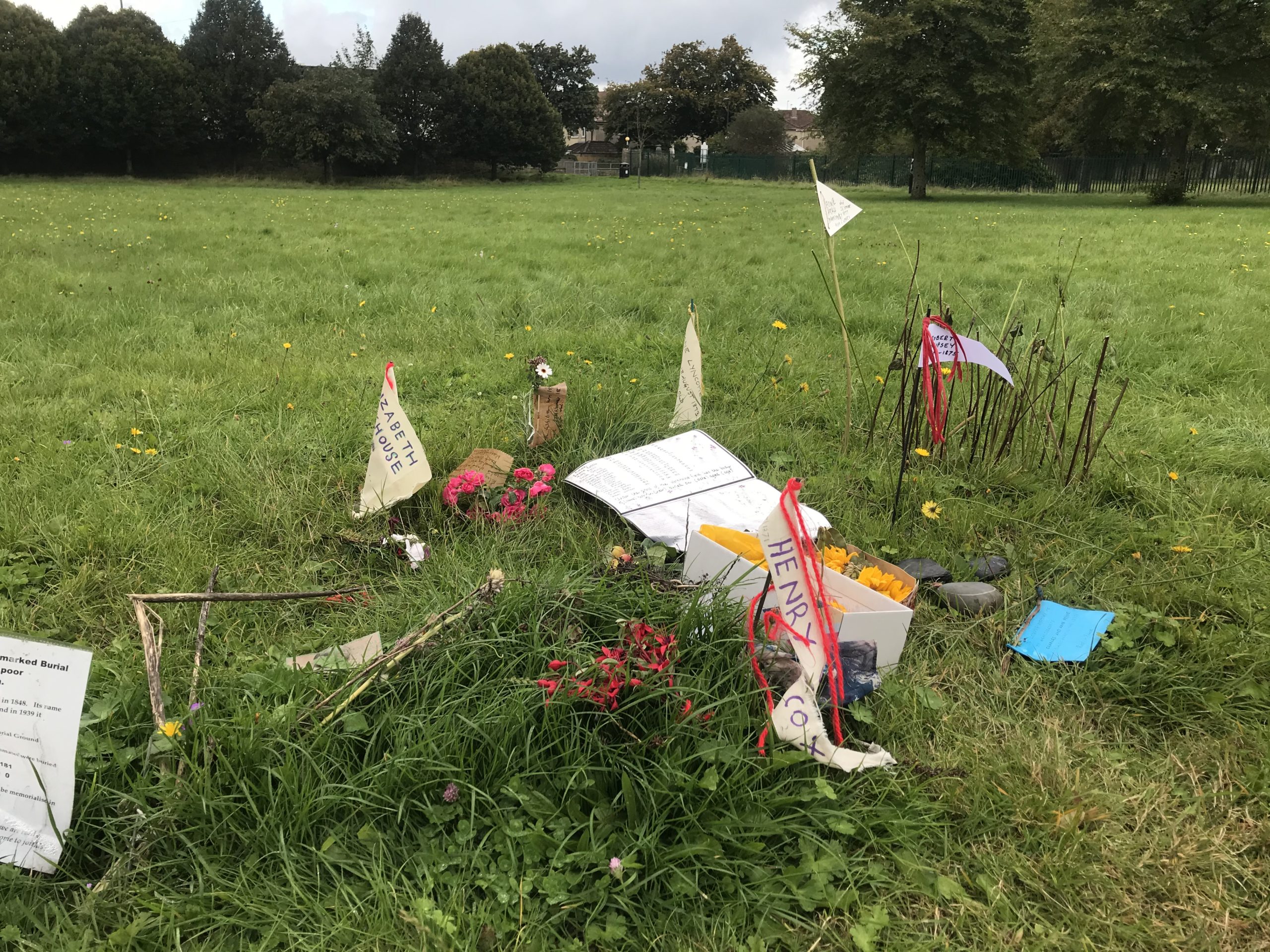Richard White is a walking and multimedia artist/researcher, and his critical walking arts process contains a strong component, focussing on social justice.
Richard’s Walking the Names is shortlisted for the Sound Walk September 2020 Awards, and is set around the Bath Workhouse Burial Grounds, a now unassuming grassy field in Bath (UK), under which are buried the bodies of 3000 people who died of poverty in the Bath Union Workhouse between 1858 and 1899.
The work offers an echo and an abstraction of walking performances that happened virtually during lockdown, also presented as a COVID-safe alternative to a live participatory performance.
Below, Richard talks about the work.
Bath Union Workhouse Burial Ground is an unloved patch of grassland alongside a block of flats and the busy road south out of the City of Bath. Here, one of the richest cities in the British Empire dumped the bodies of citizens who had died of poverty.
Surrounded by walls made of grey stone quite possibly quarried from the field itself, more than three thousand bodies are buried here. There are no headstones, there is no memorial, there is no sign to indicate that this is still consecrated ground.
The Bath Union Workhouse lies a few hundred yards away, overlooking the city. In the 1850s the on-site burial plot rapidly filled up and a field was consecrated for burials further along Wellsway. The dead were taken on a trolley through a tunnel to the new burial ground, lest they be seen. Burials took place in batches often several at once and included people of all ages, from babes in arms to veterans in their eighties and nineties.
Each death a little tragedy.
The walking
This year, I hosted and curated the Walking the Names project, a monthly slow walk about poverty and responsibility. Each month, walkers gather to walk and read from the Burial Register, or listen, or both, sensing presences, and reflecting on the stories and feelings the site evokes and presents. Reading the names of the dead in the order of their burial, gathering to share and discuss, a ‘poor’ memorial has evolved as walkers pay respects, acknowledge ancestors, and make offerings into the space.
This rediscovered and always emerging memorial has become a focus for the project.
Writer and poet John Payne introduced Richard to the Burial Ground as part of an earlier walking arts project reflecting on respect for the dead. John researched an exhibition on the Bath Union Workhouse, and they co-hosted a series of walks arising from John’s discovery of a fragment of a diary of the Workhouse School Master. Walking the Names emerged from this as a commitment to a cycle of regular practice in a monthly, participatory, performative walking and reading from the Workhouse Burial Register.
Lockdown
A group of walkers has formed around this regular practice and, when lockdown appeared to close the activity down, they agreed to continue. Some walkers walked and read on the site alone, others walked and read where they could, Richard invited walkers to digitally share their readings. Recorded readings were assembled into the sound mixes heard in the app and as separate videos. The challenge was to take these back to the site and enable them to resonate in the space. As well as presenting them in the app, I have slow walked the site with the workhouse bell and the readings playing on blue tooth speakers.
Sound Walk September presented a great reason to explore the Echoes app as a possible alternative to a physical gathering; in fact the day turned into a slow walking, socially distanced event with poetry performances and a contribution from the folk band, Bath City Jubilee Waits.
Relevance today
The Workhouse authorities, the so-called Poor Law Guardians, intended poverty to be a punishment and entry to the Workhouse to be a source of shame, with death and burial within its walls the final indignity. The rich of Bath wanted to forget and punish their impoverished citizens who could not climb out of the pit of poverty, consigning their bodies to the silence of the soil. Walking the Names breaks that silence calling out the names of the dead, bearing witness to their lives. As the project continued the death toll of the virus mounted, revealing continuing cruel inequalities. Many of the deaths from the virus are in underfunded care homes, the privatised descendants of the Workhouse. Walking the Names takes on a different and additional poignancy as we walk and think in the time of the virus.
It is ironic that the only person to have a memorial on the sites of the burials did not die of poverty and his body was never buried there. In fact, Eddie Cochran has two memorials, the rock and roll icon died after a car crash in 1960, by then the Workhouse had become a hospital. Three Steps to Heaven was one of his hits.
Richard’s reflection is the second in a series of the artists shortlisted for the Sound Walk September 2020 Awards talking about their work.


